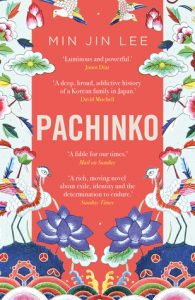 I’m reading the book Pachinko by Min Jin Lee, which is actually three books wrapped up in one! Books, not parts. It’s always a nice surprise when a book does that. It forces your reading-brain to recalibrate itself and think “OK, what I just read was a book. Now this next bit is also a book,” and figure out what the story was (or wasn’t) and what that means. The breaks feels more solid as opposed to a book that’s only broken up into parts.
I’m reading the book Pachinko by Min Jin Lee, which is actually three books wrapped up in one! Books, not parts. It’s always a nice surprise when a book does that. It forces your reading-brain to recalibrate itself and think “OK, what I just read was a book. Now this next bit is also a book,” and figure out what the story was (or wasn’t) and what that means. The breaks feels more solid as opposed to a book that’s only broken up into parts.
The structure is surprising because Pachinko has no story! Jokes. It does, but it doesn’t. If you were to ask me the plot of the novel, I wouldn’t be able to say anything other than, “It’s about a Korean family in Japan, whose lives thicken and complicate and expand with every generation.” The specifics of that thickening and complicating are less important than the simple observation of it, which Lee seems to be aware of and writes so that it take precedence, but not in the ways you would expect from this kind of book. A lot of rules get broken. There’s a lot of “head-hopping,” with the reader weaving inside and outside the heads of different characters, sometimes within the same paragraph, which is jilting (and I want to know the internal conversations that had to have taken place about this choice), but it’s a clear choice by Lee.
The more I read (and yes, I’m still reading it, almost finished), and the more the book strays from Sunja into the lives of her sons and other peripheral characters, the more I start to understand the choices Lee makes. It’s cheap to say the characters don’t matter, or that history itself is a character, or some kind of “joy in the journey” type thing, because Pachinko does what it does so much better than most generational Dramas with a capital D. A few points while reading I got the strange, uncomfortable feeling that I was holding a slimy, beating organ, not a book. The story morphs into its own thing and it refuses to be precious. But then there were other points while reading where everything felt rote, almost phonebooky. It’s a book that never wants you to think you know what it’s doing so you’re passive and meldable and open to its massive history—and it’s an incredibly good history book.
No ending for this little review because I haven’t finished reading!